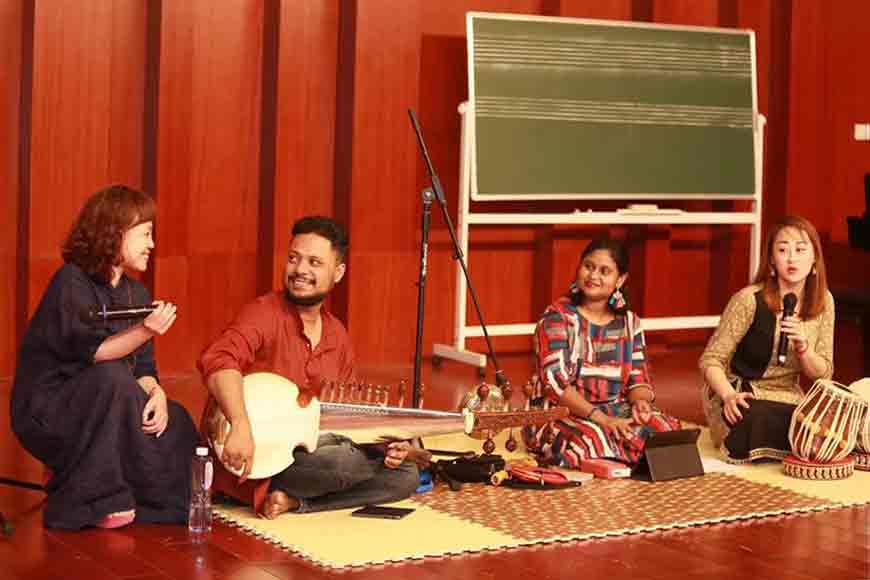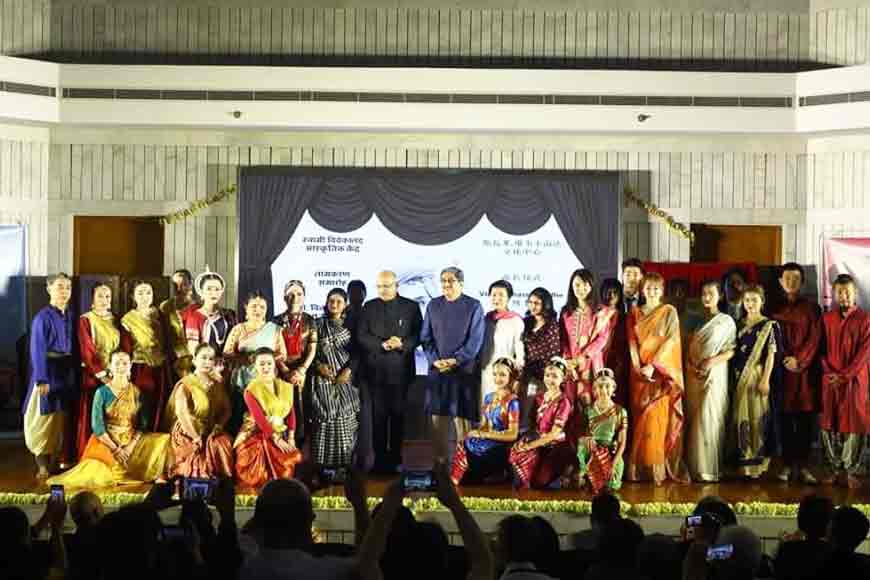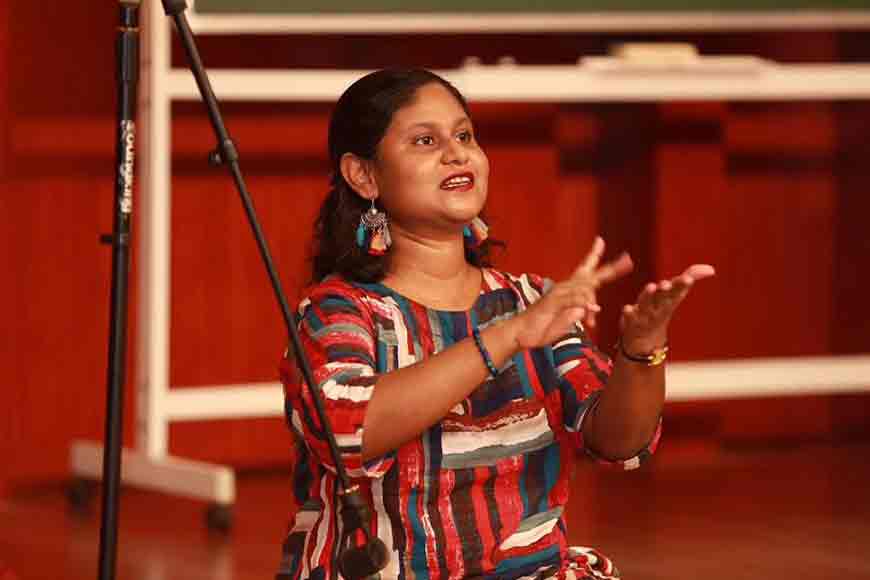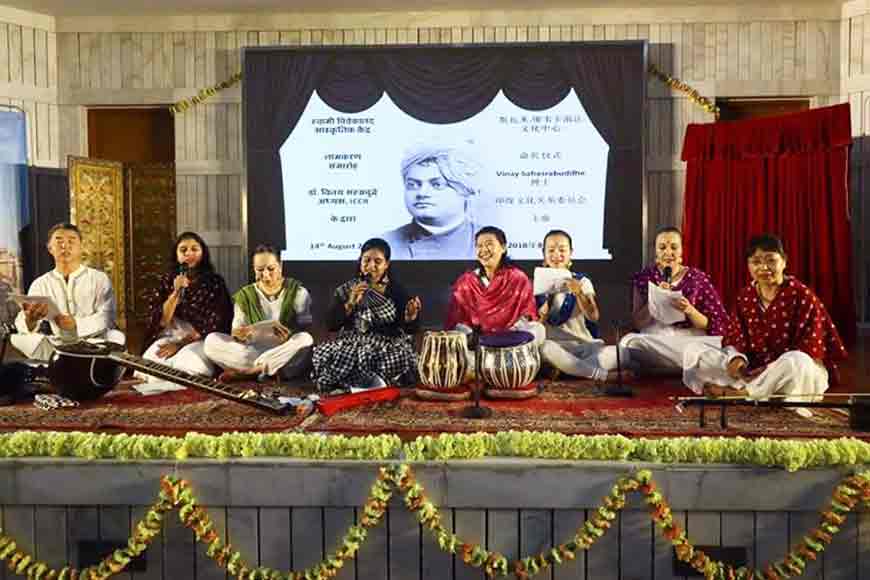Musician from Bengal popularizes Indian Classical in China!

Moumitra Mitra is a vocalist in Indian Classical Music who has popularized Indian music in Beijing! How did she do that? She tells GB readers in this exclusive interview
• Since when have you been promoting Indian classical music in China?;
I had been appointed by ICCR, as the Hindustani Classical Vocal Music teacher and performer at Embassy of India, Beijing from October 2015. Since then, me and my husband, Sayak Barua (a professional Sarod player) have been promoting Indian Classical Music in China.
 At a concert in Beijing
At a concert in Beijing
• Does Indian music have a good audience in China? If so, why?
As in the case of many other countries, people had known Indian Music through Bollywood movies or classical musicians visiting their country for performance. In case of China, it has been the same. Rabindranath Tagore personally visited China and there are many schools where Rabindrasangeet are taught even today. Pandit Ravi Shankar was invited to Beijing by Central Conservatory of Music for Performance and Workshop. Also, Bollywood films are popular in China, and their songs have a good influence on the Chinese audience. So, the Chinese people at large had been exposed to Indian Music since long.
 Moumita Mitra performing in Beijing
Moumita Mitra performing in Beijing
• How receptive are the younger generation towards your classes?
Chinese students are quite eager to learn Indian Music. I had around 60 students in music, among whom some were professional musicians, some amateur learners and some were music students from Universities. At the Embassy, I had to take music classes 5 days a week. Apart from that, we (my husband and myself) were frequently invited by schools, universities to take workshop and lecture demonstration sessions on Indian Classical Music. Some of them were well-known educational institutes of China, including, The Central Conservatory of Music at Beijing, Minzu University, Qinghua University, Agricultural University, Conservatory of Music at Tianjin, Renmin University, Jiaotong University and International School of Beijing.
• Is language a problem while singing?<
They do have difficulty in pronunciation of foreign languages due to some restrictions in their mother tongue, but the students try hard to overcome it. For example, pronunciation of ‘R’ had been the most difficult part for them. In their language, they have minimal use of ‘R’. They mostly say ‘L’ when they read ‘R’. Also, in their pinyin writing, ‘G’ is pronounced as ‘K’, ‘B’ as ‘P’, ‘D’ as ‘T’ and vice versa, hence while referring to my notations of Indian Music, in the lyric (which I wrote in English alphabets), they would read it as ‘Piya ki Najariya’ as ‘Biya Gi Najaliya’ unless corrected. But they had been quite enthusiastic in learning. After every class, I used to send them the lessons as audio via Wechat (a popular messenger in China), so that they could practice via listening. I also made it a point to write the notations of bandish of the ragas, using the Chinese style of notation which uses 1 to 7 as Do re mi fa so la si.
Another aspect which I think is difficult for any foreign musician is improvisation part of Indian Classical Music, as far as learning the compositions and pre-composed taans are concerned, they are quite reciprocating, however the improvisation part would always require a lot of time, may be quite a number of years.
• Mention the year-long events you or your peer groups organise to popularise Indian music in China
Apart from regular classes at the Embassy, there are performances, workshops and lecture demonstrations held at various universities like Central Conservatory of Music, Minzu University, Jiaotong University, Renmin University and others. All performances and workshops are based on Indian Classical Music. Introduction and popularising musical instruments like Sarod was done by my husband Sayak Barua, who also taught few Chinese musicians and regularly performed, conducted workshops on Indian Classical Instrumental music.
 Performance at a concert in Beijing
Performance at a concert in Beijing
• Are you also working with Bengal’s indigenous music? For example, Baul, Jhumur or even Rabindrasangeet?
My post being in the name of Hindustani Classical Music Vocal teacher cum performer, primarily, Indian Classical music was being taught and performed. But Chinese students were also quite fond of Rabindrasangeet as they were aware that Rabindranath Tagore visited China and hence Rabindrasangeet is quite popular. During Rabindra Jayanti I performed Rabindrasangeet too.










